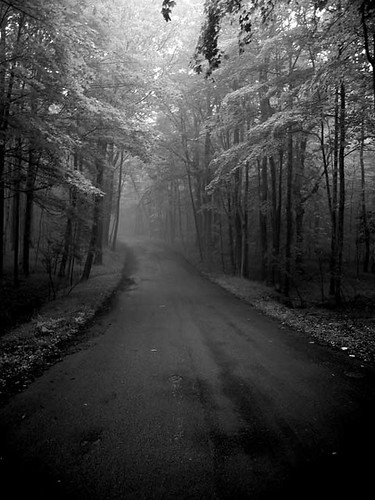
{Photo by rocketlass.}
In the wake of the long, involved Austerity Britain, I've felt the need for its opposite: books that are petite and circumscribed i their intent, but no less potent--bursts of intensity rather than drawn-out explorations. So I've pillaged my bookshelves for narrow-spined volumes, and for the past few days I've carried half a dozen books with me on the train every day, blazing through one and then choosing another. I think that's the form my whole weekend is likely to take.
Coincidentally, the first couple I've read have had fabulous openings, the sort that instantly establish an unforgettable tone and, were you to read them in a bookstore, would send you straight to the cash register to buy the book so you can enjoy the rest of it on your back steps with a martini.
The first paragraphs of Muriel Spark's The Prime of Miss Jean Brodie (1961) don't feature Miss Brodie, the book's unforgettable central character, whom in the supplementary materials to the HarperPerennial edition Hal Hager describes as
fascinatingly complex, idealistic, self-deluded, vulnerable, vital, romantic, preposterous, lonely, gregarious, outspoken, [and] solipsistic--to which I'd have to add "inadvertently malevolent," or even "slightly sinister." They do, however, establish a singular mood and prose rhythm--attentive and matter-of-fact, yet subtly ironic about the world of rules and conventions portrayed--that drew me right in:
The boys, as they talked to the girls from Marcia Blaine School, stood on the far side of their bicycles holding the handlebars, which established a protective fence of bicycle between the sexes, and the impression that at any moment the boys were likely to be away.
The girls could not take off their panama hats because this was not far from the school gates and hatlessness was an offense. Certain departures from the proper set of the hat on the head were overlooked in the case of fourth-form girls and upwards so long as nobody wore their hat at an angle. But there were other subtle variants from the ordinary rule of wearing the brim turned up at the back and down at the front. The five girls, standing very close to each other because of the boys, wore their hats each with a definite difference.
Georges Simenon's The Man Who Watched Trains Go By (1938) opens in a totally different register. Crime novels, perhaps more than any others, need to declare their tone at the start. The lurid cover, after all, has already told us roughly what to expect inside: bad behavior--possibly stretching to murder--and most likely some sex and consequences. The question is how we'll get it, and what the author's relationship to the contents will be. Will he, like Chandler or Graham Greene, create for us a fallen world suffering the consequences of its rot? Will we get the matter-of-fact, crime-as-workplace approach of Donald Westlake? Perhaps the story will be filtered through the knowing perseverance of a Lawrence Block narrator?
Simenon, in the opening paragraphs of The Man Who Watched Trains Go By, announces, loudly, that we will be dealing with inexorable fate, and an ordinary man caught up in its brutal machinery:
As far as Kees Popinga was personally concerned, it shoudl be admitted that at eight in the evening there was still time: his fate, among others, had yet to be sealed. But time for what? And what else could he have done other than what he did do, convinced as he was that his actions were of no more consequence than during the thousands and thousands of days that had gone before?A nice touch, from the former newspaperman Simenon, the transfiguration of the utterly ordinary family photo into a frightening talisman of dark renown.
He would have shrugged in disbelief had someone told him that his life was about to change radically, that the photograph on the side table showing him standing in the middle of his family, with one hand casually resting on the back of a chair, would soon be printed in every newspaper across Europe.
I was going to stop with two, but then I picked up Gregoire Bouillier's odd little memoir, The Mystery Guest: An Account (2004), which I read a couple of nights ago, and couldn't resist sharing its deliberately casual and opaque first page, too:
It was the day Michel Leiris died. This would have been late September 1990, or maybe the very beginning of October, the date escapes me (whatever it was I can always look it up later on); in any case it was a Sunday, because I was at home in the middle of the afternoon, and it was cold out, and I'd gone to sleep in all my clothes, wrapped up in a blanket the way I often would when I was alone. Cold and oblivion were all I was looking for back then, but this didn't worry me. Sooner or later, I knew, I'd rejoin the world of the living. Just not yet. I felt I had seen enough. Beings, things, landscapes . . . I had enough to last me for the next two hundred years and why go hunting for new material? I didn't want any trouble.Deceptive in so many ways, that opening frankly invites us to conspire with Bouillier--to acquiesce to his pretense that there's still time for him to clarify the date--and offers, in exchange, it seems, so much. He's seen enough? Enough to last two hundred years before he has to rejoin the living? What could possibly be next?
The answer, though, turns out to be both more pedestrian than you would expect--a mysteriously ended love affair--and yet strangely interesting, even comforting, regardless. Like the others I've written about today, The Mystery Guest is a modest book, but its pleasures and rewards are genuine, and I hope to write more about it soon. For now, I'll close by saying that Bouillier lives up to the implicit credo in the following statement about dreams:
The significance of a dream, we're told, has less to do with its overt drama than with the details; a long time ago it struck me that the same was true of real life, of what passes among us for real life.Paying attention to the details: the novelist's art in brief.
Enjoy the weekend, and remember to raise a glass to the labor movement. We'll never pay them back enough for what they've given us.








